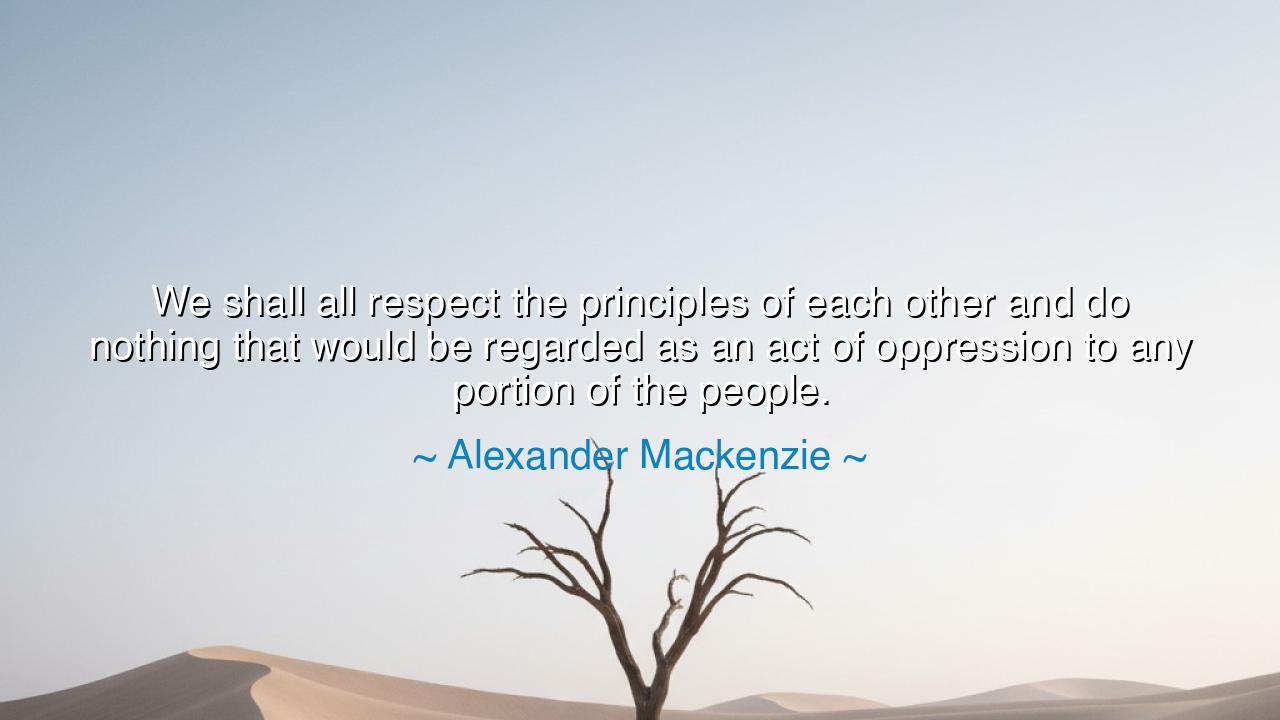
We shall all respect the principles of each other and do nothing
We shall all respect the principles of each other and do nothing that would be regarded as an act of oppression to any portion of the people.






The words of Alexander Mackenzie—“We shall all respect the principles of each other and do nothing that would be regarded as an act of oppression to any portion of the people.”—resound with the spirit of justice and brotherhood. They are not mere words of diplomacy, but a declaration of the sacred covenant that must bind together any free people. At their heart lies the recognition that societies endure not by conquest or domination, but by mutual respect, by honoring the principles that guide each individual and community, and by restraining the hand of power from descending into oppression.
The meaning of this teaching is clear: liberty cannot survive without respect. To crush the principles of another is to plant the seeds of division, mistrust, and rebellion. Mackenzie, as a statesman, understood that a nation is a delicate fabric, woven of diverse voices, beliefs, and traditions. If one portion is torn by oppression, the whole is weakened. Only by honoring the dignity of each group, and refusing to trample their rights, can the structure stand firm. Thus, his words shine as both a warning and a guide, a call to unity through justice.
The ancients, too, spoke of this wisdom. When the Athenian democracy flourished, it was because citizens were allowed to speak and to live according to their conscience, even when opinions differed. But when Athens turned to oppression—forcing its rule upon its allies through fear and tribute—the empire faltered and collapsed. Mackenzie’s words echo this ancient lesson: that no power, however great, can endure when built upon the suffering of a portion of its people.
History offers another example in the reign of Emperor Ashoka of India. In his early years, Ashoka ruled with cruelty and oppression, seeking to expand his empire through war. But after witnessing the suffering of the conquered at Kalinga, he repented and vowed to rule with compassion and respect. He proclaimed edicts carved in stone, commanding his officials to honor all faiths, to oppress none, and to treat all people with fairness. His empire, once feared, became admired, remembered for justice rather than tyranny. Mackenzie’s call to do nothing that would be regarded as oppression is of the same spirit: to choose peace, respect, and fairness over domination.
The emotional weight of this teaching lies in its universality. Every people, in every age, has known the sting of oppression, whether through chains, unfair laws, or the silencing of voices. Mackenzie’s words rise as a shield against that ancient wound. They remind us that true greatness lies not in ruling over others, but in lifting them, in guarding their freedom, and in walking side by side as equals. For oppression may win obedience for a season, but only respect wins loyalty for generations.
The lesson is clear: let no portion of the people be oppressed, lest the whole body suffer. In our lives, this means practicing fairness in our dealings, honoring the beliefs of others even when they differ from our own, and resisting the temptation to use strength or privilege at the expense of the weak. A nation, a community, even a household can endure only when justice reigns and oppression is banished.
Practical action follows. Stand against unfairness wherever it is found. Defend the dignity of those whose voices are small. Listen with respect to principles that are not your own, and seek harmony rather than domination. For to respect another’s principles does not weaken your own; it strengthens the bond of trust that makes peace possible.
Thus, Alexander Mackenzie’s words endure as a beacon: respect is the foundation of freedom, and oppression the seed of ruin. Let every generation remember that true strength is shown not in how we command others, but in how we honor them. Only then shall a people live in unity, and only then shall a nation be worthy of its destiny.






AAdministratorAdministrator
Welcome, honored guests. Please leave a comment, we will respond soon